Our Latest Work
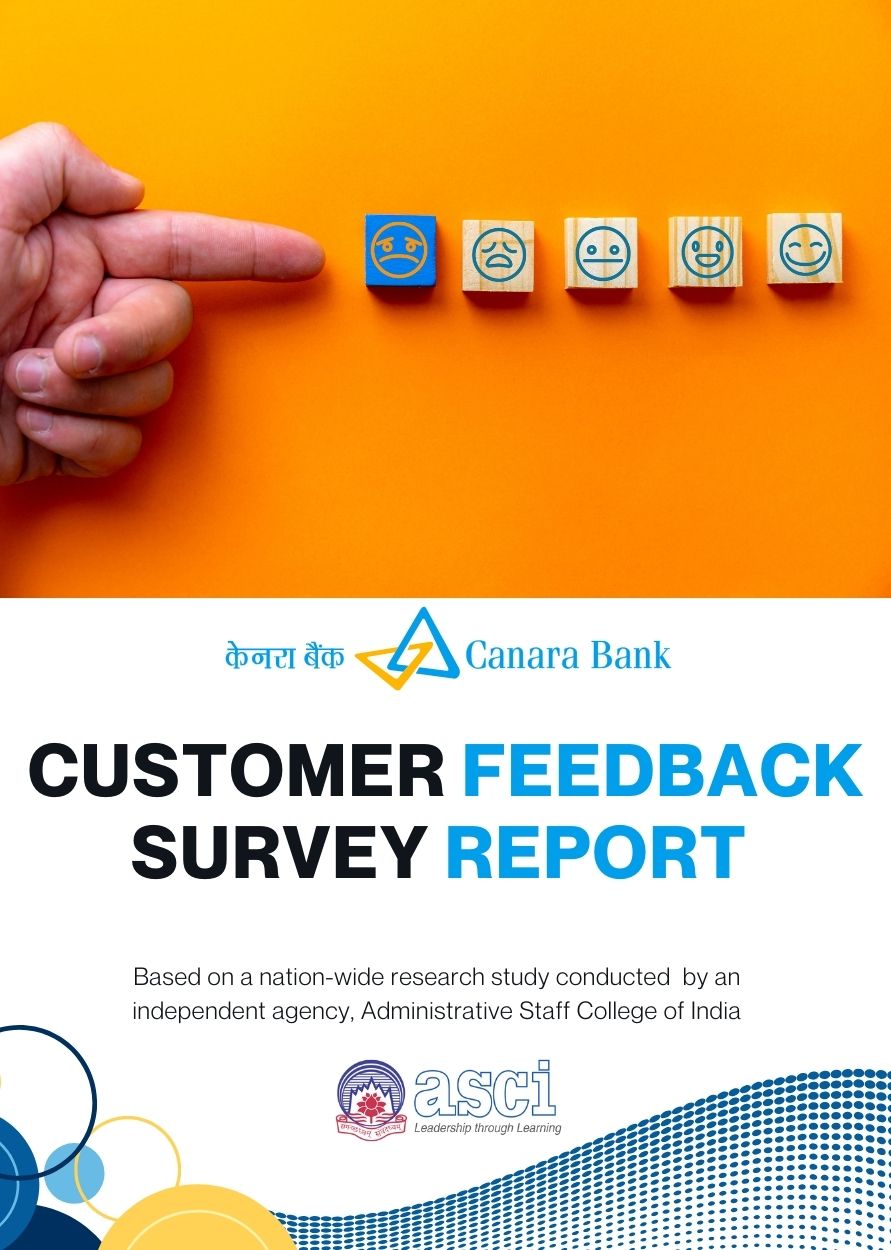
Customer Feedback Survey for a Bank
Sahadya, working as a subconsultant for the Administrative Staff College of India (ASCI), conducted an extensive Customer Feedback Survey for Canara Bank to assess customer satisfaction across its diverse branches. The survey aimed to gather insights into service quality, branch ambiance, digital banking services, and overall customer experiences, covering urban, semi-urban, and rural branches nationwide. Recognizing the changing dynamics of the banking industry, Canara Bank sought to understand customer needs and expectations better, using this feedback to enhance its service offerings.
Sahadya played a vital role in executing the survey, leveraging a robust methodology that included in-person interactions with customers, structured questionnaires, and the use of digital tools for real-time data collection. The survey reached a broad demographic, including both current customers and those who had recently closed their accounts, ensuring comprehensive insights. Sahadya’s involvement ensured efficient data collection, quick validation, and immediate availability for analysis.
The feedback collected through this survey allowed Canara Bank to identify areas for improvement, address customer concerns, and benchmark performance across different branches and regions. The findings helped Canara Bank enhance customer loyalty, improve service quality, and stay aligned with the evolving expectations of its customer base, ensuring continued competitiveness in the banking sector.
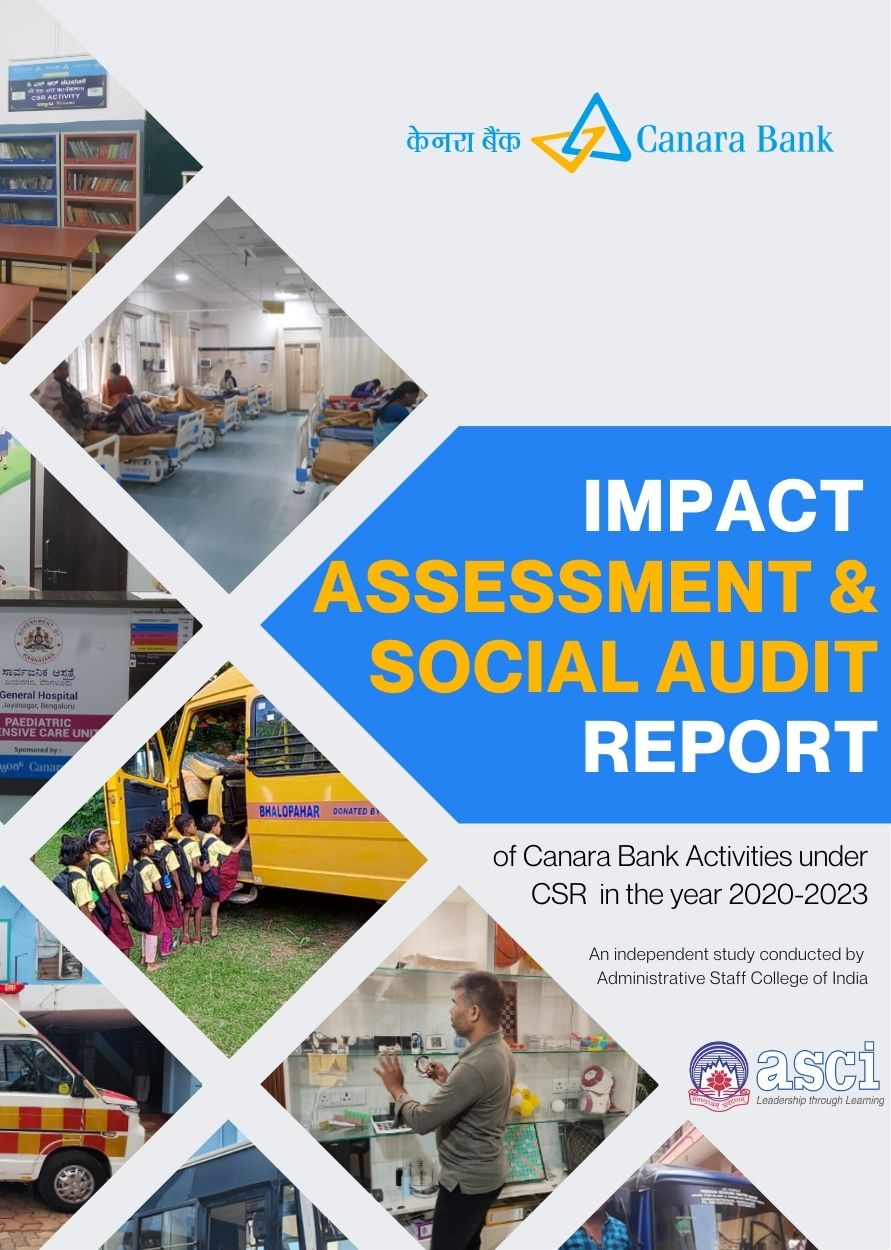
Social Audit & Impact Assessment Report
Sahadya, working as a subconsultant conducted a comprehensive Social Audit and Impact Assessment of Canara Bank’s Corporate Social Responsibility (CSR) initiatives. This study evaluated 104 projects spanning key sectors such as health, education, support for persons with disabilities (PWD), community development, and environmental sustainability. Canara Bank’s CSR projects aim to improve public health, education, and overall community well-being by providing resources like medical equipment, educational tools, and environmental support.
Sahadya played a vital role in assessing the effectiveness, efficiency, and sustainability of these initiatives through a combination of site visits, stakeholder interviews, and data collection. Projects were categorized based on budget and thematic focus, allowing for a structured and in-depth evaluation of their impact. Feedback was gathered from beneficiaries and stakeholders to understand the social outcomes and challenges of each project.
The insights from this assessment helped Canara Bank refine its CSR strategy, ensuring its programs continue to make a meaningful contribution to societal progress and align with the bank’s corporate philosophy of “serving beyond banking.”

Online Assessment Tech
Sahadya has developed advanced online assessment technology for banking clients such as Canara Bank, Punjab National Bank (PNB), Indian Bank and many more, specifically designed for internal employee evaluations. These assessments, which include psychometric and competency tests, are used for promotion evaluations and year-end performance assessments, ensuring a thorough evaluation of employees’ skills, cognitive abilities, and behavioral traits.
In addition to these assessments, Sahadya implemented a 360-degree feedback system, allowing for comprehensive feedback from peers, supervisors, and subordinates. This holistic approach to evaluation enhances the decision-making process, enabling banks to make informed choices regarding employee development, promotions, and performance improvement strategies. Through these tools, Sahadya supports banks in fostering a more effective and transparent performance management system.
In addition to these assessments, Sahadya also implemented a 360-degree feedback system, allowing for comprehensive feedback from peers, supervisors, and subordinates. This holistic approach to evaluation enhances the decision-making process, enabling banks to make informed choices regarding employee development, promotions, and performance improvement strategies. Through these tools, Sahadya supports banks in fostering a more effective and transparent performance management system.
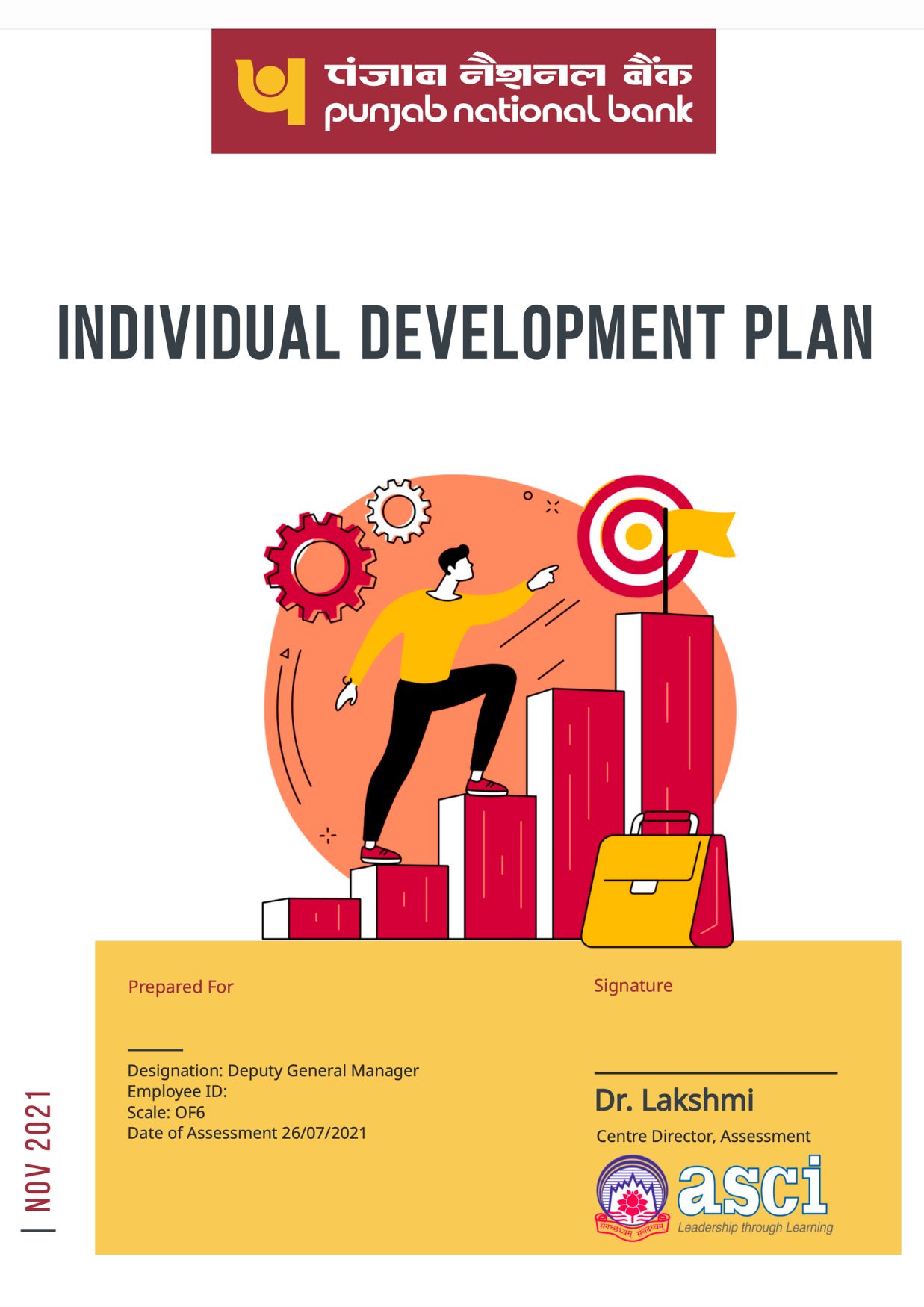
Individual Development Plans & Reports
As part of the competency assessments, Sahadya has designed Individual Development Plans (IDPs) to support the growth and development of employees within the banking sector. These IDPs are tailored to each employee’s specific competencies, skills, and career goals, ensuring a personalized approach to professional growth. By analyzing the results from psychometric tests, competency assessments, and 360-degree feedback, Sahadya creates a roadmap for continuous improvement.
The IDPs focus on identifying areas of strength and opportunities for development, providing actionable steps for employees to enhance their performance and achieve their career objectives. This holistic approach aligns personal growth with the organizational goals, fostering a culture of continuous learning and development. Through the use of IDPs, Sahadya enables banking clients to invest in their employees’ long-term success, improving both individual and organizational performance.
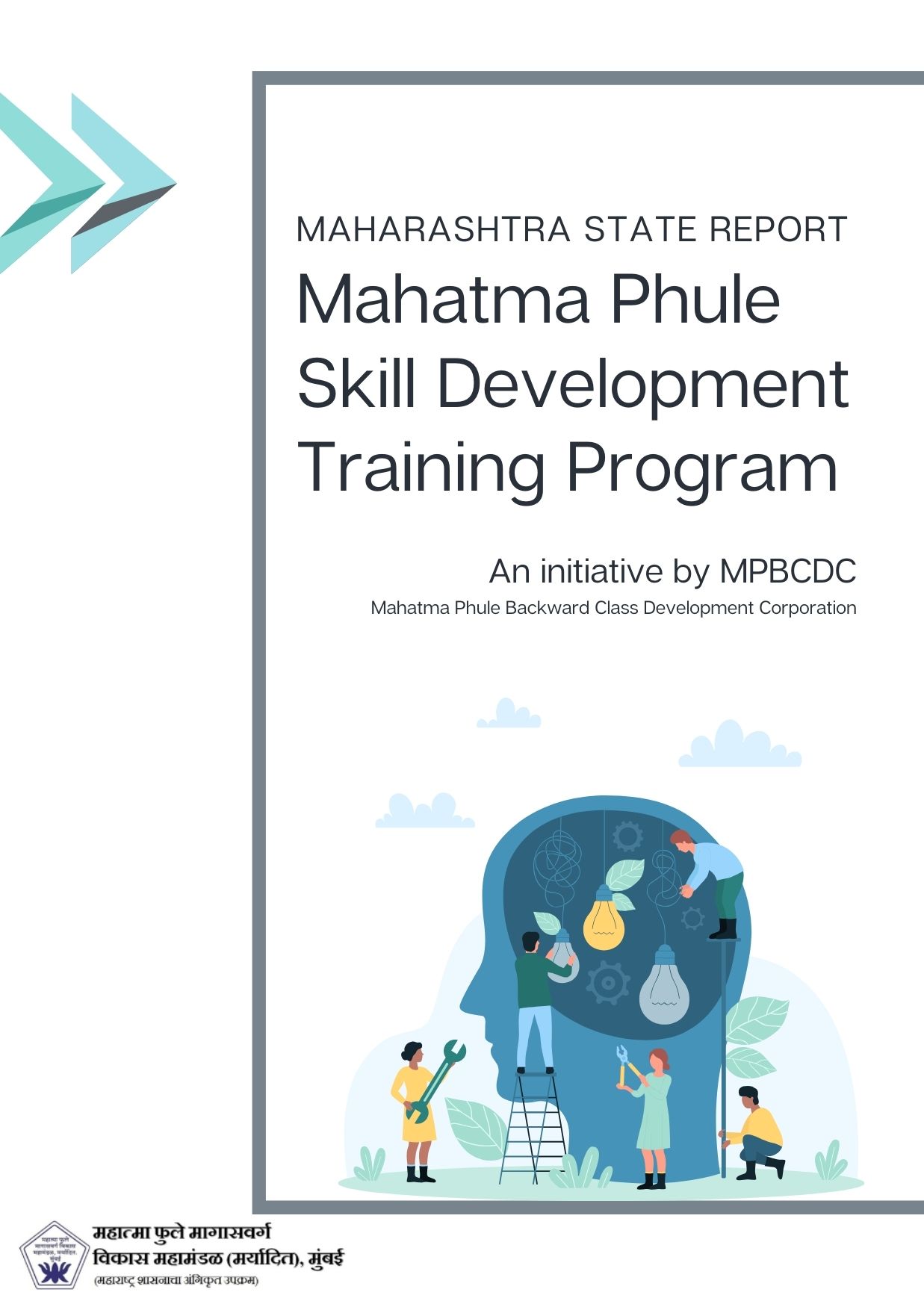
Skill Development Training Program
The Skill Development Training Program in Maharashtra, sponsored by the Mahatma Phule Backward Class Development Corporation (MPBCDC), saw Sahadya playing an instrumental role in its execution. The program aimed at training approximately 5000 Scheduled Caste (SC) candidates across all 36 districts of Maharashtra, empowering them with essential skills for better employability and entrepreneurship. Sahadya facilitated courses in a wide range of fields, including beauty parlour services, tailoring, Tally with GST, computer hardware, data entry, driving, plumbing, fashion designing, and mobile repairing.
In addition to conducting the training, Sahadya developed a dedicated portal, JobSkills.in, to streamline candidate registrations, manage course details, and provide job placement assistance. The program resulted in 268 candidates securing job placements, while 2653 opted for self-employment, contributing to their financial independence and local economic growth.
With strong support from MPBCDC and local stakeholders, the initiative successfully addressed the skill development needs of SC candidates across Maharashtra. The distribution of certificates and stipends further motivated participants, solidifying the program’s contribution to the socio-economic upliftment of marginalized communities in the state.
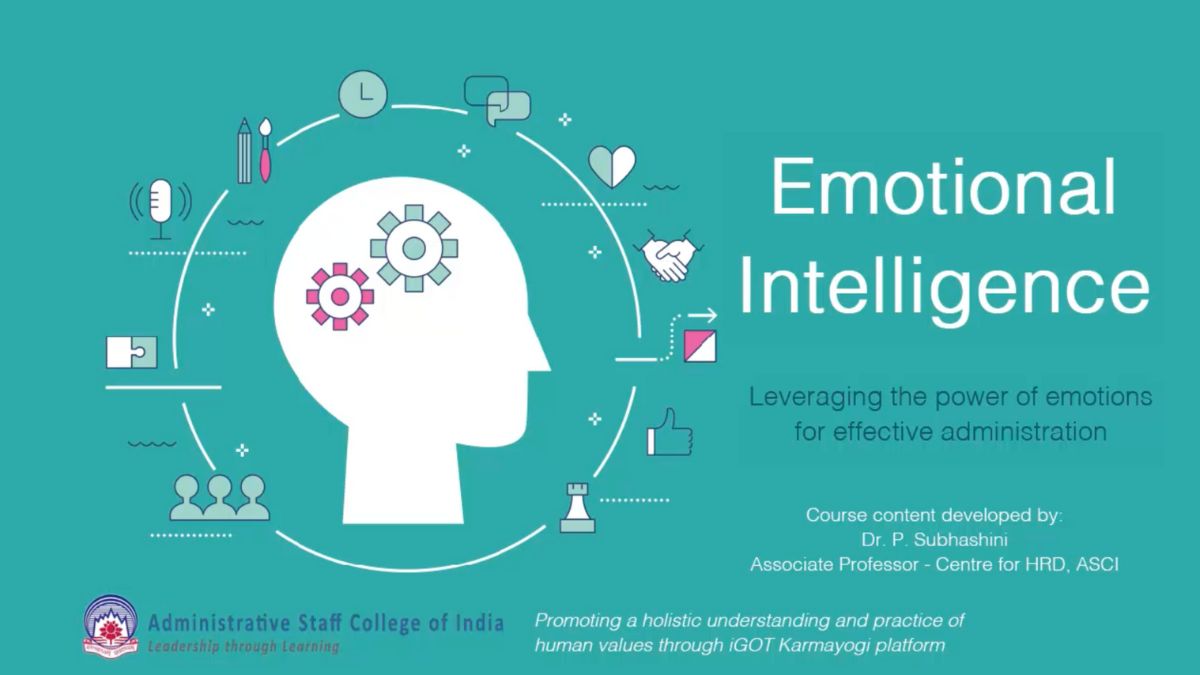
E-Learning Content
Sahadya has been instrumental in developing e-learning content for ASCI’s professional development courses, including Emotional Intelligence, Conflict Management, and other key topics. Utilizing Adobe Captivate, Sahadya designed interactive, engaging, and user-friendly modules tailored to enhance learning outcomes for participants. The content is designed to be accessible and effective, ensuring that learners gain valuable skills in navigating workplace dynamics and personal development. By leveraging cutting-edge e-learning tools, Sahadya supports ASCI’s mission of providing high-quality education and training to professionals across various sectors.

Assessment Study on JLG Financing in AP
The “Assessment Study on Joint Liability Group (JLG) Financing in Andhra Pradesh” was undertaken by Sahadya Enterprises working as a sub-consultant for ASCI, commissioned by NABARD in February 2020. The study aimed to assess the performance and status of JLG financing in the state, focusing on understanding the factors contributing to stagnation in JLG outreach over the past two years, especially when compared to other Southern states. The major objectives included evaluating the current state of JLG financing, identifying issues affecting its growth, and suggesting measures to overcome these challenges.
The study used a mixed methodology, combining both primary and secondary research. Primary research involved structured interviews with JLG beneficiaries, primarily group leaders, conducted via phone. This allowed the study to capture insights into group dynamics, loan performance, and associated challenges. Additionally, semi-structured interviews with stakeholders such as officials from District Cooperative Central Banks (DCCBs), Regional Rural Banks (RRBs), and NGOs provided further qualitative data.
Secondary research, including data from NABARD, helped triangulate findings and assess the state’s relative performance over five years (2015-2020). The study concluded with an evaluation matrix based on its objectives, providing a comprehensive assessment of JLG performance and suggesting practical measures for improving JLG financing in Andhra Pradesh.

Research Study on Jogini women in AP
This NABARD sponsored study aimed to assess the current situation of Joginis and women affected by trafficking in the Anantapur district of AP, with a focus on understanding their social and economic conditions and developing strategies for rehabilitation. Key objectives included identifying the number of affected women, evaluating awareness of Women Self-Help Groups (WSHGs), and examining the effectiveness of existing government schemes. The study also sought to provide case studies and suggest steps for integrating these women into mainstream society.
A qualitative methodology was used, focusing on two mandals, Bommanahal and Gummagatta, where the issue was most prevalent. We partnered with the local NGO Mass Education and Organization Society (MEOS), experienced in working with trafficking victims. Respondents were identified through the snowballing method, involving SHG leaders and other local stakeholders.
Structured schedules were developed to gather data from 50 affected women, covering their health, education, financial inclusion, and basic living conditions. The schedules were translated into Telugu for easier interpretation. Informal discussions with local leaders and Jogini women provided deeper insights into personal stories of abuse and resilience. Based on initial findings, the research was confined to Bommanahal and Direhal, where the prevalence of the Jogini system was highest, using a “Convenient Sampling” approach.
